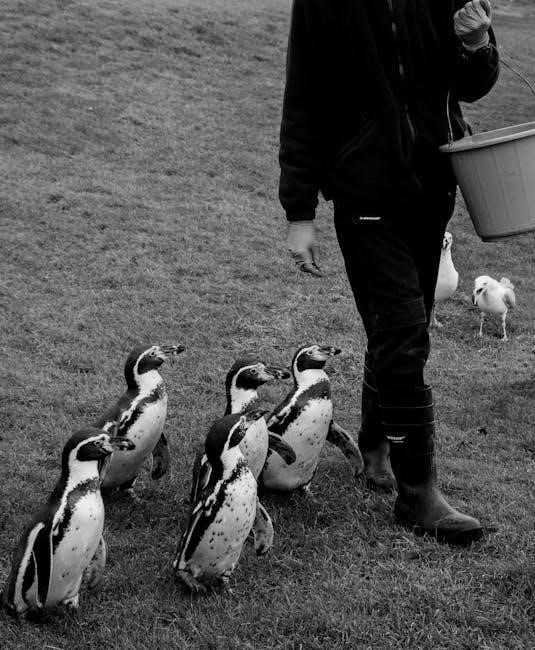Mr․ Popper’s Penguins is a beloved children’s book written by Richard and Florence Atwater, first published in 1938․ The story follows Mr․ Popper, a house painter living in Stillwater, as he inherits a group of penguins that transform his life․ This charming tale explores themes of family, responsibility, and the unexpected adventures that bring joy and chaos․ The book has become a classic, delighting readers with its wit and heartwarming lessons․
1․1 Overview of the Book
Mr․ Popper’s Penguins, written by Richard and Florence Atwater, is a charming children’s novel published in 1938․ The story revolves around Mr․ Popper, a house painter in the quaint town of Stillwater, whose life takes an unexpected turn when he inherits a group of penguins․ Initially seeing them as a burden, Mr․ Popper soon discovers the joy and chaos they bring to his family․ The book is a delightful blend of humor, adventure, and heartwarming lessons, making it a timeless classic for readers of all ages․ Its whimsical narrative and lovable characters have captivated audiences for generations․
1․2 Background and Historical Context
Mr․ Popper’s Penguins, written by Richard and Florence Atwater, was first published in 1938 during the Great Depression․ The story reflects the era’s optimism and simplicity, offering a light-hearted escape․ Its whimsical tale of a man and his penguins resonated with readers seeking joy amidst hardship․ The book became a Newbery Honor Book in 1939, highlighting its cultural significance․ It beautifully blends humor with moral lessons, emphasizing themes of family, responsibility, and adaptation, which were particularly relevant during the challenging 1930s․ The novel’s enduring appeal lies in its timeless story, universal themes, and the heartwarming, lovable characters that have captivated readers for generations․

Plot Summary of “Mr․ Popper’s Penguins”
Mr․ Popper’s Penguins tells the story of a house painter in Stillwater who inherits a group of penguins, leading to chaotic yet heartwarming adventures that transform his life․
2․1 The Setting: Stillwater in the 1930s
The story unfolds in Stillwater, a small, traditional town in the 1930s․ This setting reflects the simplicity and conservatism of the era, with a strong sense of community․ The Popper family resides here, navigating life amid the Great Depression․ Stillwater’s quiet, predictable environment contrasts with the chaos brought by the penguins, highlighting the transformative impact of their arrival․ The town’s charm and tight-knit society serve as a backdrop for Mr․ Popper’s journey, blending humor with heartfelt lessons about family and responsibility․
2․2 Key Events: From Penguins to Chaos
Mr․ Popper’s life takes a dramatic turn when he inherits a group of penguins from his deceased father, an Antarctic explorer․ Initially confused and overwhelmed, he tries to manage the unexpected gift․ The penguins quickly cause chaos, disrupting the quiet routine of the Popper household․ As the family embraces the birds, they begin to train them, leading to comedic and heartwarming moments․ However, the growing number of penguins creates financial and logistical challenges, forcing Mr․ Popper to make difficult decisions․ The story unfolds with a mix of humor and heartache, showcasing the transformative power of unexpected responsibility․

Main Characters in “Mr․ Popper’s Penguins”
Mr․ Popper, a kind-hearted house painter, is the protagonist․ The penguins, intelligent and charming, play a central role․ Mrs․ Popper supports her family through chaos․ Admiral Drake, a father figure, influences Mr․ Popper’s journey, symbolizing guidance and inspiration in his life․
3․1 Mr․ Popper: The Protagonist
Mr․ Popper, a poor house painter in Stillwater during the 1930s, is a kind-hearted but struggling family man․ His life changes dramatically when he inherits a group of penguins from his late father, an Antarctic explorer․ Initially overwhelmed, Mr․ Popper learns to embrace the chaos the penguins bring, discovering a deep sense of responsibility and love․ His journey transforms him from a distant, preoccupied father to a caring, involved parent․ Through his adventures, Mr․ Popper showcases resilience, humor, and a heartwarming ability to grow and adapt in unexpected circumstances․
3․2 The Penguins: Their Role in the Story
The penguins in Mr․ Popper’s Penguins are more than just unusual pets; they serve as catalysts for change․ Their arrival brings both chaos and joy to the Popper family, forcing Mr․ Popper to confront his responsibilities and reconnect with his children․ The penguins’ unique personalities and antics add humor and charm to the story, while their presence also teaches the family valuable lessons about love, sacrifice, and the importance of coming together․ Ultimately, the penguins become a symbol of redemption and the transformative power of unexpected events in life․

Themes and Messages
Mr․ Popper’s Penguins explores themes of family, responsibility, and redemption․ The penguins symbolize unexpected challenges and the power of love, teaching Mr․ Popper to embrace life’s surprises․
4․1 Family and Parenthood
Family and parenthood are central to Mr․ Popper’s Penguins․ The story highlights the challenges and joys of raising a family, as Mr․ Popper learns to balance his role as a father with his newfound responsibilities for the penguins․ Through his journey, he discovers the importance of connecting with his children and the value of family unity․ The penguins act as a catalyst, helping him mend strained relationships and become a more engaged and loving parent․ This theme underscores the transformative power of family love and commitment․
4․2 Responsibility and Sacrifice
Mr․ Popper’s Penguins emphasizes the importance of responsibility and sacrifice․ When Mr․ Popper inherits the penguins, he must adapt his life to care for them, despite the financial and logistical challenges․ The story highlights his commitment to ensuring their well-being, even when it requires significant personal sacrifices․ This journey teaches him the value of duty and the rewards of putting others’ needs before his own․ The penguins become a symbol of his growth, showing how embracing responsibility can lead to unexpected joy and fulfillment․
4․3 The Power of Love and Redemption
Mr․ Popper’s Penguins showcases the transformative power of love and redemption․ Initially distant from his family, Mr․ Popper’s life changes when the penguins bring unexpected joy and connection․ Through his dedication to caring for them, he learns to prioritize love and rebuild relationships with his wife and children․ The penguins symbolize redemption, as they help Mr․ Popper overcome his emotional barriers and rediscover the importance of family bonds․ This heartwarming journey highlights how love can heal past wounds and bring people together in the most unexpected ways, offering a hopeful message about personal growth and forgiveness․

The Impact and Legacy of “Mr․ Popper’s Penguins”
Mr․ Popper’s Penguins has left a lasting legacy as a heartwarming story about family and responsibility․ Its adaptation into a popular movie starring Jim Carrey further amplified its cultural impact, making it a beloved tale for generations․ The story’s themes of love, sacrifice, and redemption continue to resonate, ensuring its place as a timeless classic in children’s literature and beyond․
5․1 Movie Adaptation: Jim Carrey’s Version
In 2011, Mr․ Popper’s Penguins was adapted into a family comedy film starring Jim Carrey․ The movie deviates slightly from the original book, portraying Mr․ Popper as a wealthy businessman rather than a house painter․ The film follows his journey as he inherits penguins, leading to chaos and eventual redemption․ Carrey’s comedic talents bring the character to life, blending humor with heartfelt moments about family and responsibility․ While the movie takes creative liberties, it captures the essence of the book’s themes, making it a delightful watch for both children and adults․ Its success further cemented the story’s place in popular culture․
5․2 Cultural Significance and Reception
Mr․ Popper’s Penguins has become a cultural classic, cherished for its timeless themes of family, responsibility, and redemption․ The book’s whimsical storyline and heartwarming lessons have resonated with readers across generations․ Its portrayal of a man finding purpose through unexpected challenges has made it a beloved tale in children’s literature․ The story’s light-hearted humor and moral depth have also been praised for appealing to both kids and adults․ Over the years, it has been widely reviewed and celebrated, with many considering it a must-read for its enduring message about the importance of love, care, and personal growth․
Mr․ Popper’s Penguins is a heartwarming tale that reminds us of the importance of family, love, and embracing life’s unexpected challenges․ Its timeless message continues to inspire readers of all ages, making it a cherished classic in children’s literature․
6․1 Final Thoughts on the Story
Mr․ Popper’s Penguins is a timeless tale of transformation and redemption․ The story captures the essence of family, love, and responsibility through Mr․ Popper’s unexpected journey with the penguins․ His evolution from a distant father to a caring parent highlights the story’s emotional depth․ The penguins serve as catalysts for change, teaching valuable life lessons wrapped in humor and charm․ The narrative’s ability to balance lighthearted moments with profound themes makes it a beloved classic․ Ultimately, the story reminds us that life’s surprises can lead to growth and the discovery of what truly matters․
6․2 Relevance in Modern Context
Despite being written in 1938, Mr․ Popper’s Penguins remains remarkably relevant today․ Its themes of family, responsibility, and redemption resonate with modern audiences․ The story’s emphasis on balancing personal aspirations with familial duties mirrors contemporary challenges of work-life balance․ Additionally, the penguins’ presence highlights environmental and conservation themes, sparking discussions about humanity’s role in caring for wildlife․ The narrative’s lighthearted yet profound approach to life’s complexities makes it a timeless tale, offering lessons on adaptability and the importance of finding joy in unexpected circumstances․ Its universal appeal ensures its continued resonance in today’s fast-paced world․
